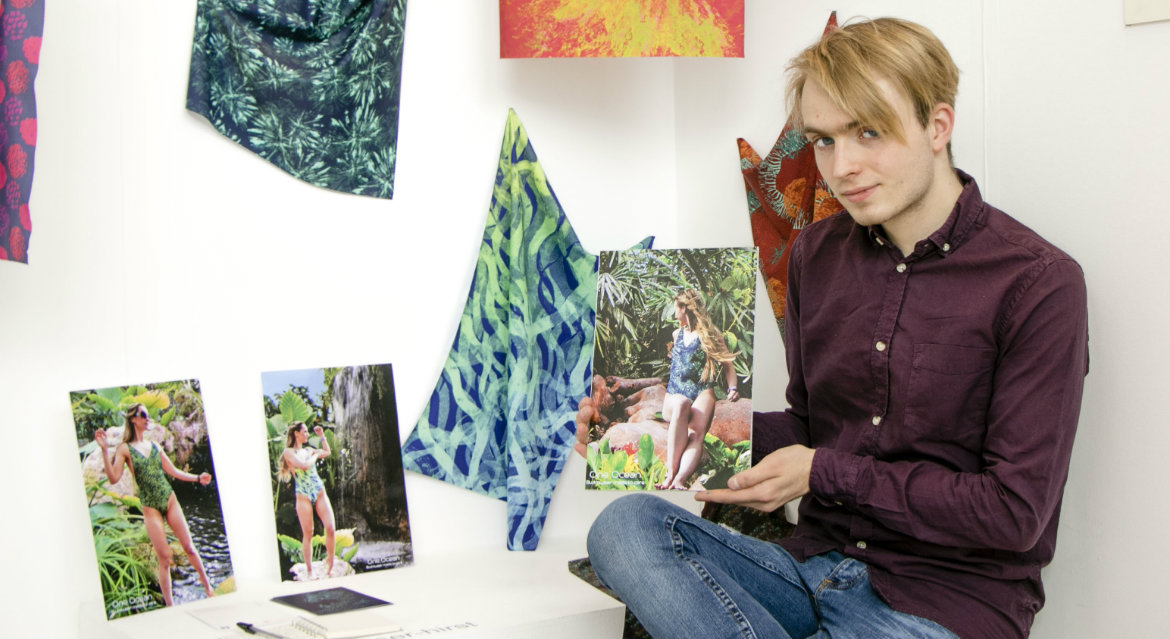Fishing net bikinis to help protect oceans
Published On Thu 25 May 2017 by Grant Hill

Fishing nets and bikinis may not be obvious bedfellows but a student from Duncan of Jordanstone College of Art & Design believes combining the two offers a way of protecting the world’s oceans from ecological damage.
Scott Fraser-Hirst, who is currently exhibiting at this year’s University of Dundee Art, Design and Architecture Degree Show, hit upon the idea of using recycled fishing nets to make swimwear after reading an article about the devastation that climate change has wreaked upon the Great Barrier Reef.
Textile Design graduand Scott spent the final year of his course researching ways of minimising the environmental impact of the sportswear and fishing industries. His solution is ‘One Ocean’, a conceptual swimwear collection that utilises Econyl, a fabric made from recycled fishing nets. The fabric is 100% recyclable and has a lower carbon footprint than other equivalent synthetic fabrics.
The collection uses digital processes printing which reduces pollution, water and printed material waste. Some 600,000 tons of nylon fishing gear are dumped into the world’s oceans each year, harming marine life already under threat from pollution and rising sea and Co2 levels.
Scott (21), originally from Leeds, said, “I was shocked to see how the Great Barrier Reef was disappearing because of the impact of our lives. Man-made is what you hear whether it’s about climate change or synthetic materials that feature in clothing so I thought there had to be a way of using the concept of man-made in a positive way.
“As things are, fish get caught in discarded nets. Making nets and swimwear means Co2 emissions. Higher rates of carbon in the water and rising sea level endanger maritime life as well as beautiful and iconic coral reefs. Econyl has a lower carbon footprint than nylon so it offers a way of minimising environmental impact.
“I think people have a perception that because it is made from fishing nets it will be coarse and uncomfortable but it is actually very soft and smooth. The main reason why swimwear is not widely recycled is because nylon, its main source material, is very complex and expensive to recycle due to its low boiling point. Therefore many companies choose not to recycle the synthetic.
“When I started doing this project I didn’t know whether Econyl would be suitable fabric but I’ve shown that it can be digitally printed on. Aquafil, the sole producer of Econyl, kindly gave me the fabric for the project for free and were touched to learn that they had inspired me to carry out One Ocean, for which I’ve devised the slogan ‘swimwear made to care’.
“The marine-themed designs embody a symbiotic relationship between us and nature aimed at building our connection with the oceanic environment. Now that I’ve shown that it works with print I would like to create a full One Ocean collection of bikinis and explore the idea of producing them commercially.”
Scott is a graduand of the BDes (hons) Textile Design course, which was last week ranked 3rd in the UK in the Guardian University Guide 2018. He is one of almost 350 students from Duncan of Jordanstone and the University’s Architecture programme exhibiting at this year’s Degree Show.
Admission is free and the show if open from 10am until 8pm (Monday – Friday) and 10am to 4pm (Saturday – Sunday) until Sunday, 28th May.
More information is available at http://www.dundee.ac.uk/djcad/degreeshow/.
For media enquiries contact:
Grant Hill
Press Officer
University of Dundee
Nethergate, Dundee, DD1 4HN
Tel: +44 (0)1382 384768
Mobile: 07854 953277
Email: g.hill@dundee.ac.uk